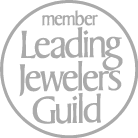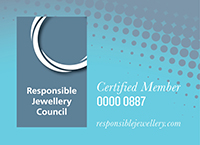When enough is enough.

By: Bob DeMaria
Bob DeMaria has 45 years experience in sales and marketing both as an inside and outside sales representative within RDI Diamonds and the wholesale jewelry industry. Bob welcomes any feedback or suggestions for future topics. He can be reached at 800-874-8768 ext. 110 or by email at bdemaria@rdidiamonds.com.
In my position as a diamond wholesaler, I get to hear many of the frustrations that retailers feel regarding selling diamonds. For that matter, sales in general are often difficult to come by. Competition is fierce. Whether it`s other brick and mortar stores, the Internet or a friend "that knows a guy", persuading a consumer to part with their money takes skill and effort.
In sales, especially regarding a ‘blind` item like diamonds (‘blind` meaning that the consumer would normally have little personal knowledge of the product and must rely on the opinion of others) we walk a fine line between educating the customer and instilling in them enough confidence in us as a provider to pull the trigger.
Imparting too much information can be very dangerous. Sales are often lost when a consumer is basically taught how to shop you. We as salespeople are often consumed by the idea that we want the customer to leave our store knowing that they got the perfect deal. However, if they don`t commit, right then and there, we will have created a customer that is fully armed to shop elsewhere.
How do we avoid this?
The number one rule is that (in our own minds) we need to develop a sense of urgency. Nothing good happens by waiting. The opportunity to sell someone something is never higher than at the first meeting. Every subsequent encounter has a lower chance of success.
The second part of this rule is that the sense of urgency needs to be transferred to your customer, not in the form of overt pressure, but more subtly in the form of desire.
No two diamonds are exactly alike. Even in the case where two diamonds are well matched, one will always look a little better than the other. The important thing is that you create a desire for that particular diamond rather than a shape, size, color or clarity. Stressing the individuality of a singular diamond makes closing a sale much more likely.
My grandfather told me at a very young age "never volunteer anything". While most of that thinking fell on deaf ears, it`s really very applicable in sales. Over educating is definitely a rule you should NEVER break. Many of us feel we must make a point of discussing every aspect of a diamond, whether based on our ego or because we think it`s the best way to sell, it`s often a mistake.
Is it always necessary to point out and explain all the particulars of a diamond? No. In your qualifying discussion you need to find out what`s important to your customer. If the customer wants the process to be simple, keep it simple. Some customers will ask and expect details especially when they have been comparison-shopping. That`s fine too. Just make sure you react to the customer and tailor your approach based on what you`ve learned from them.
A customer that`s been shopping around, is someone that hasn`t been satisfied by what they`ve seen or the process they`ve been exposed to, or both. This situation creates a golden opportunity for you to qualify them better, find them a more appropriate option and deliver a better experience.
Many cons

umers get confused and/or overwhelmed when they know what they want but the salesperson chooses to focus on features that they are not concerned with. The customer becomes flooded with information they didn`t need or didn`t even know to ask. With diamonds, we feel it`s necessary to always give detailed descriptions of color and clarity to customers when often they really only wanted something that looked pretty and was in their budget. They will become confused and a confused mind won`t buy. However, they are now armed with a few more facts, that they were previously unaware of, as they head down to the next jeweler hoping that someone else will help them find clarity (no pun intended!).
The best way to figure out when enough is enough is by using the information discovered in the qualify. Your customer will tell you what it takes to sell them if you pose the right questions and then listen to the answers. My own personal experience as a consumer has always been to reward salespeople that really listen to me and present me with options based on my needs or desires and are within my budget.
Customers that walk without buying are telling you something is wrong. Before you let them leave you need to find out what that is. Go back to basics and re-qualify. If you have touched on areas that have left them with more questions, make sure you have addressed them to their satisfaction.
"So tell me, in a perfect world what would be the perfect diamond for you?" That question may sound too simplistic, however, it`s a great way to find out if your customer is technically oriented or just wants the process to be easy. A customer that wants details has probably been shopping elsewhere, but that doesn`t mean he or she understands the specifics that they are asking about; you may need to educate and/or clarify. Understand that the clarity you provide may be exactly what will drive them back to the last person they talked to.
Just keep in mind that most consumers buy from the places and people that make them feel the most comfortable. Be that person!
 By: Bob DeMaria
Bob DeMaria has 45 years experience in sales and marketing both as an inside and outside sales representative within RDI Diamonds and the wholesale jewelry industry. Bob welcomes any feedback or suggestions for future topics. He can be reached at 800-874-8768 ext. 110 or by email at bdemaria@rdidiamonds.com.
In my position as a diamond wholesaler, I get to hear many of the frustrations that retailers feel regarding selling diamonds. For that matter, sales in general are often difficult to come by. Competition is fierce. Whether it`s other brick and mortar stores, the Internet or a friend "that knows a guy", persuading a consumer to part with their money takes skill and effort.
In sales, especially regarding a ‘blind` item like diamonds (‘blind` meaning that the consumer would normally have little personal knowledge of the product and must rely on the opinion of others) we walk a fine line between educating the customer and instilling in them enough confidence in us as a provider to pull the trigger.
Imparting too much information can be very dangerous. Sales are often lost when a consumer is basically taught how to shop you. We as salespeople are often consumed by the idea that we want the customer to leave our store knowing that they got the perfect deal. However, if they don`t commit, right then and there, we will have created a customer that is fully armed to shop elsewhere.
How do we avoid this?
The number one rule is that (in our own minds) we need to develop a sense of urgency. Nothing good happens by waiting. The opportunity to sell someone something is never higher than at the first meeting. Every subsequent encounter has a lower chance of success.
The second part of this rule is that the sense of urgency needs to be transferred to your customer, not in the form of overt pressure, but more subtly in the form of desire.
No two diamonds are exactly alike. Even in the case where two diamonds are well matched, one will always look a little better than the other. The important thing is that you create a desire for that particular diamond rather than a shape, size, color or clarity. Stressing the individuality of a singular diamond makes closing a sale much more likely.
My grandfather told me at a very young age "never volunteer anything". While most of that thinking fell on deaf ears, it`s really very applicable in sales. Over educating is definitely a rule you should NEVER break. Many of us feel we must make a point of discussing every aspect of a diamond, whether based on our ego or because we think it`s the best way to sell, it`s often a mistake.
Is it always necessary to point out and explain all the particulars of a diamond? No. In your qualifying discussion you need to find out what`s important to your customer. If the customer wants the process to be simple, keep it simple. Some customers will ask and expect details especially when they have been comparison-shopping. That`s fine too. Just make sure you react to the customer and tailor your approach based on what you`ve learned from them.
A customer that`s been shopping around, is someone that hasn`t been satisfied by what they`ve seen or the process they`ve been exposed to, or both. This situation creates a golden opportunity for you to qualify them better, find them a more appropriate option and deliver a better experience.
Many cons
By: Bob DeMaria
Bob DeMaria has 45 years experience in sales and marketing both as an inside and outside sales representative within RDI Diamonds and the wholesale jewelry industry. Bob welcomes any feedback or suggestions for future topics. He can be reached at 800-874-8768 ext. 110 or by email at bdemaria@rdidiamonds.com.
In my position as a diamond wholesaler, I get to hear many of the frustrations that retailers feel regarding selling diamonds. For that matter, sales in general are often difficult to come by. Competition is fierce. Whether it`s other brick and mortar stores, the Internet or a friend "that knows a guy", persuading a consumer to part with their money takes skill and effort.
In sales, especially regarding a ‘blind` item like diamonds (‘blind` meaning that the consumer would normally have little personal knowledge of the product and must rely on the opinion of others) we walk a fine line between educating the customer and instilling in them enough confidence in us as a provider to pull the trigger.
Imparting too much information can be very dangerous. Sales are often lost when a consumer is basically taught how to shop you. We as salespeople are often consumed by the idea that we want the customer to leave our store knowing that they got the perfect deal. However, if they don`t commit, right then and there, we will have created a customer that is fully armed to shop elsewhere.
How do we avoid this?
The number one rule is that (in our own minds) we need to develop a sense of urgency. Nothing good happens by waiting. The opportunity to sell someone something is never higher than at the first meeting. Every subsequent encounter has a lower chance of success.
The second part of this rule is that the sense of urgency needs to be transferred to your customer, not in the form of overt pressure, but more subtly in the form of desire.
No two diamonds are exactly alike. Even in the case where two diamonds are well matched, one will always look a little better than the other. The important thing is that you create a desire for that particular diamond rather than a shape, size, color or clarity. Stressing the individuality of a singular diamond makes closing a sale much more likely.
My grandfather told me at a very young age "never volunteer anything". While most of that thinking fell on deaf ears, it`s really very applicable in sales. Over educating is definitely a rule you should NEVER break. Many of us feel we must make a point of discussing every aspect of a diamond, whether based on our ego or because we think it`s the best way to sell, it`s often a mistake.
Is it always necessary to point out and explain all the particulars of a diamond? No. In your qualifying discussion you need to find out what`s important to your customer. If the customer wants the process to be simple, keep it simple. Some customers will ask and expect details especially when they have been comparison-shopping. That`s fine too. Just make sure you react to the customer and tailor your approach based on what you`ve learned from them.
A customer that`s been shopping around, is someone that hasn`t been satisfied by what they`ve seen or the process they`ve been exposed to, or both. This situation creates a golden opportunity for you to qualify them better, find them a more appropriate option and deliver a better experience.
Many cons umers get confused and/or overwhelmed when they know what they want but the salesperson chooses to focus on features that they are not concerned with. The customer becomes flooded with information they didn`t need or didn`t even know to ask. With diamonds, we feel it`s necessary to always give detailed descriptions of color and clarity to customers when often they really only wanted something that looked pretty and was in their budget. They will become confused and a confused mind won`t buy. However, they are now armed with a few more facts, that they were previously unaware of, as they head down to the next jeweler hoping that someone else will help them find clarity (no pun intended!).
The best way to figure out when enough is enough is by using the information discovered in the qualify. Your customer will tell you what it takes to sell them if you pose the right questions and then listen to the answers. My own personal experience as a consumer has always been to reward salespeople that really listen to me and present me with options based on my needs or desires and are within my budget.
Customers that walk without buying are telling you something is wrong. Before you let them leave you need to find out what that is. Go back to basics and re-qualify. If you have touched on areas that have left them with more questions, make sure you have addressed them to their satisfaction.
"So tell me, in a perfect world what would be the perfect diamond for you?" That question may sound too simplistic, however, it`s a great way to find out if your customer is technically oriented or just wants the process to be easy. A customer that wants details has probably been shopping elsewhere, but that doesn`t mean he or she understands the specifics that they are asking about; you may need to educate and/or clarify. Understand that the clarity you provide may be exactly what will drive them back to the last person they talked to.
Just keep in mind that most consumers buy from the places and people that make them feel the most comfortable. Be that person!
umers get confused and/or overwhelmed when they know what they want but the salesperson chooses to focus on features that they are not concerned with. The customer becomes flooded with information they didn`t need or didn`t even know to ask. With diamonds, we feel it`s necessary to always give detailed descriptions of color and clarity to customers when often they really only wanted something that looked pretty and was in their budget. They will become confused and a confused mind won`t buy. However, they are now armed with a few more facts, that they were previously unaware of, as they head down to the next jeweler hoping that someone else will help them find clarity (no pun intended!).
The best way to figure out when enough is enough is by using the information discovered in the qualify. Your customer will tell you what it takes to sell them if you pose the right questions and then listen to the answers. My own personal experience as a consumer has always been to reward salespeople that really listen to me and present me with options based on my needs or desires and are within my budget.
Customers that walk without buying are telling you something is wrong. Before you let them leave you need to find out what that is. Go back to basics and re-qualify. If you have touched on areas that have left them with more questions, make sure you have addressed them to their satisfaction.
"So tell me, in a perfect world what would be the perfect diamond for you?" That question may sound too simplistic, however, it`s a great way to find out if your customer is technically oriented or just wants the process to be easy. A customer that wants details has probably been shopping elsewhere, but that doesn`t mean he or she understands the specifics that they are asking about; you may need to educate and/or clarify. Understand that the clarity you provide may be exactly what will drive them back to the last person they talked to.
Just keep in mind that most consumers buy from the places and people that make them feel the most comfortable. Be that person! 





















